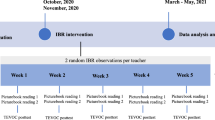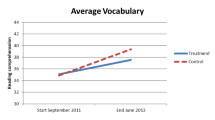Abstract
The purpose of this study was to investigate the effect of a storybook-based academic vocabulary learning intervention for young children from low-income families. The transition to primary school is particularly challenging for low-income children. To help smooth this transition, this study implemented an academic vocabulary learning program using storybook-based activities. High-frequency general academic vocabulary was extracted from a corpus compiled from transcripts of kindergarten and primary-level classroom instruction, primary-level textbooks, and lesson plans presented in kindergarten curriculum guidelines. An experimental group was provided with opportunities to learn the target academic vocabulary while reading storybooks and participating in follow-up activities, when a control group participated in regular shared storybook reading sessions. The study found that the experimental group showed significantly more growth than the control group in knowledge of the target academic vocabulary.
Similar content being viewed by others
Notes
Introduced in 2012, Nuri is a national curriculum in Korea for all children aged 3–5 attending any type of early childhood education or child care center.
A comparison between the academic words selected in the study and those on the 570-item Academic Word List (AWL) created by Coxhead (2000) found overlap between 11 words: the Korean equivalents of feature, criteria, symbol, dimension, instruct, investigate, category, require, select, conduct, and predict.
References
Abedi, J., Lord, C., Hofstetter, C., & Baker, E. (2000). Impact of accommodation strategies on English language learners’ test performance. Educational Measurement: Issues and Practice, 19(3), 16–26.
Ahtola, A., Silinskas, G., Poikonen, P. L., Kontoniemi, M., Niemi, P., & Nurmi, J. E. (2011). Transition to formal schooling: Do transition practices matter for academic performance? Early Childhood Research Quarterly, 26(3), 295–302.
Bailey, A. L. (Ed.). (2007). The language demands of school: Putting academic English to the test. New Haven, CT: Yale University Press.
Bailey, A., & Butler, F. (2003). An evidentiary framework for operationalizing academic language for broad application to K-12 education: A design document. CSE Report 611. Los Angeles, CA: National Center for Research on Evaluation, Standards, and Student Testing (CRESST).
Baker, L., Dreher, M. J., & Guthrie, J. T. (2000). Engaging young readers: Promoting achievement and motivation. New York: Guilford Press.
Barlow, M. (1995). MonoConc Pro. Houston, TX: Athelstan.
Beck, I. L., McKeown, M. G., & Kucan, L. (2008). Creating robust vocabulary: Frequently asked questions and extended examples. New York: Guilford.
Biemiller, A., & Slonim, N. (2001). Estimating root word vocabulary growth in normative and advantaged populations: Evidence for a common sequence of vocabulary acquisition. Journal of Educational Psychology, 93, 498–520.
Chall, J. S., Jacobs, V. A., & Baldwin, L. E. (1990). The reading crisis: Why poor children fall behind. Cambridge, MA: Harvard University Press.
Cooper, C. E., Crosnoe, R., Suizzo, M. A., & Pituch, K. A. (2010). Poverty, race, and parental involvement during the transition to elementary school. Journal of Family Issues, 31(7), 859–883.
Corsaro, W. A., & Molinari, L. (2005). I compagni: Understanding children’s transition from preschool to elementary school. New York, NY: Teachers College Press.
Coxhead, A. (2000). A new academic word list. TESOL Quarterly, 34(2), 213–238.
Cummins, J. (1979) Cognitive/academic language proficiency, linguistic interdependence, the optimum age question and some other matters. Working Papers on Bilingualism, 19, 121–129.
Cummins, J. (1980). The entry and exit fallacy in blingual education. NABE Journal, 4(3), 25–59.
Cummins, J., Brown, K., & Sayers, D. (2007). Literacy, technology, and diversity: Teaching for success in changing times. Boston, MA: Pearson.
Dickinson, D. K., & Smith, M. W. (1994). Long-term effects of preschool teachers’ book readings on low-income children’s vocabulary and story comprehension. Reading Research Quarterly, 29(2), 104–122.
Dowsett, C. J., Huston, A. C., Imes, A. E., & Gennetian, L. (2008). Structural and process features in three types of child care for children from high and low income families. Early Childhood Research Quarterly, 23, 69–93.
Duke, N. K., & Kays, J. (1998). “Can I say ‘once upon a time’?”: Kindergarten children developing knowledge of information book language. Early Childhood Research Quarterly, 13(2), 295–318.
Dunn, L., & Dunn, L. (1981). Peabody picture vocabulary test revised. Circle Pines, MN: American Guidance Services.
Gee, J. G. (1991). What is literacy? In C. Mitchell & K. Weiler (Eds.), Rewriting literacy: Culture and the discourse of the other (pp. 3–11). New York, NY: Bergin & Garvey.
Green, J. L., & Dixon, C. N. (1993). Talking knowledge into being: Discursive and social practices in classrooms. Linguistics and Education, 5(3), 231–239.
Haag, N., Heppt, B., Stanat, P., Kuhl, P., & Pant, H. A. (2013). Second language learners’ performance in mathematics: Disentangling the effects of academic language features. Learning and Instruction, 28, 24–34.
Hargrave, A. C., & Sénéchal, M. (2000). A book reading intervention with preschool children who have limited vocabularies: The benefits of regular reading and dialogic reading. Early Childhood Research Quarterly, 15(1), 75–90.
Hart, B., & Risley, T. (1995). Meaningful differences in the everyday experience of young children. Baltimore: Brookes.
Heppt, B., Haag, N., Böhme, K., & Stanat, P. (2015). The role of academic-language features for reading comprehension of language-minority students and students from low-SES families. Reading Research Quarterly, 50(1), 61–82.
Hoff, E. (2003). The specificity of environment influence: Socioeconomic status affects early vocabulary development via maternal speech. Child Development, 74, 1368–1378.
Jacobs, V. (2008). Adolescent literacy: Putting the crisis in context. Harvard Educational Review, 78(1), 7–39.
Kim, J. W. (2009). Exploring Korean mothers` socially constructed meaning of school readiness in lower and higher socioeconomic status communities. International Journal of Early Childhood Education, 15(1), 65–86.
Lesaux, N. K., Kieffer, M. J., Faller, S. E., & Kelley, J. G. (2010). The effectiveness and ease of implementation of an academic vocabulary intervention for linguistically diverse students in urban middle schools. Reading Research Quarterly, 45(2), 196–228.
Loesch, H. M. (2015). The efficacy of teaching academic vocabulary to kindergarteners in an explicit, literacy based method (Unpublished master’s thesis). Grand Forks, ND: The University of North Dakota.
Monkeviciene, O., Mishara, B. L., & Dufour, S. (2006). Effects of the Zippy’s Friends programme on children’s coping abilities during the transition from kindergarten to elementary school. Early Childhood Education Journal, 34(1), 53–60.
Nagy, W., & Townsend, D. (2012). Words as tools: Learning academic vocabulary as language acquisition. Reading Research Quarterly, 47(1), 91–108.
Okado, Y., Bierman, K. L., & Welsh, J. A. (2014). Promoting school readiness in the context of socio-economic adversity: Associations with parental demoralization and support for learning. Child & Youth Care Forum, 43(3), 353–371.
Pressley, M., & Allington, R. L. (2014). Reading instruction that works: The case for balanced teaching. New York: Guilford Publications.
Ranney, S. (2012). Defining and teaching academic language: Developments in K-12 ESL. Language and Linguistics Compass, 6(9), 560–574.
Seth, M. J. (2002). Education fever: Society, politics, and the pursuit of schooling in South Korea. Honolulu, HI: University of Hawaii Press.
Snow, C. E. (2010). Academic language and the challenge of reading for learning about science. Science, 328(5977), 450–452.
Snow, C. E., Lawrence, J. F., & White, C. (2009). Generating knowledge of academic language among urban middle school students. Journal of Research on Educational Effectiveness, 2(4), 325–344.
Townsend, D., & Collins, P. (2009). Academic vocabulary and middle school English learners: An intervention study. Reading and Writing, 22(9), 993–1019.
Townsend, D., Filippini, A., Collins, P., & Biancarosa, G. (2012). Evidence for the importance of academic word knowledge for the academic achievement of diverse middle school students. Elementary School Journal, 112(3), 497–518.
Uttal, L. (1999). Using kin for child care: Embedment in the socioeconomic networks of extended families. Journal of Marriage and Family, 61(4), 845–857.
Yeboah, D. A. (2002). Enhancing transition from early childhood phase to primary education: Evidence from the research literature. Early Years: An International Journal of Research and Development, 22(1), 51–68.
Zwiers, J. (2013). Building academic language: Essential practices for content classrooms, grades 5–12. San Francisco, CA: Wiley.
Author information
Authors and Affiliations
Corresponding author
Rights and permissions
About this article
Cite this article
Kim, MJ. Efficacy of an Academic Vocabulary Intervention for Low-Income Children. Asia-Pacific Edu Res 26, 43–50 (2017). https://doi.org/10.1007/s40299-017-0325-6
Published:
Issue Date:
DOI: https://doi.org/10.1007/s40299-017-0325-6




